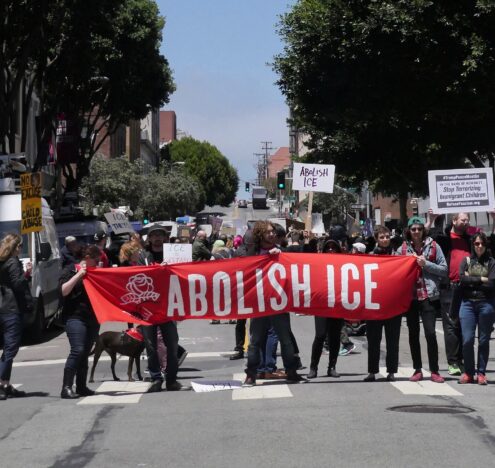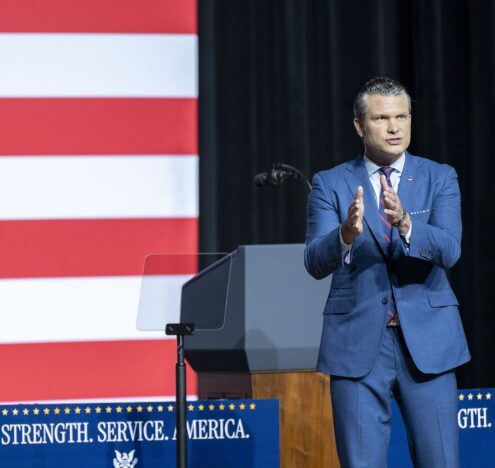With her passing, Madeleine Albright, a Czechoslovakia-born refugee who grew up to be the first woman to serve as US secretary of state, left a legacy underscored by a strong commitment to freedom and a personal understanding of the tyranny of authoritarianism. Among her many achievements as a diplomat was her work to champion the expansion of NATO in the 1990s and 2000s “to extend eastward the peace and prosperity that western Europe has enjoyed for the last 50 years.”
Albright’s open-armed welcome of countries east of the Iron Curtain into a values-based political and military defense alliance was a demonstration of a nascent feminist foreign policy — elevating self-determination and democracy, and rejecting the lingering colonialism and imperialism of centuries of Russian rule. Yet, in the ramp up to and since the war in Ukraine began, many analysts have argued that this move was a misstep, instead pointing to the so-called “legitimate security threat” wrought by the expansion of NATO to Russia’s borders — usually with little regard for the people on the other side of the line.
“Vladimir Putin bears primary responsibility for this latest development, but NATO’s arrogant, tone-deaf policy toward Russia over the past quarter-century deserves a large share as well,” wrote Ted Galen Carpenter, a senior fellow at the Cato Institute. Thomas Friedman, quoting George Kennan from 1998, bemoaned the “tragic mistake” of bringing Eastern European nations into the NATO fold, calling it an “ill-considered decision by the US.” Such takes have been published across the spectrum of media outlets and think tanks — from The Economist to Fox News.
To keep with this view not only in spite of Russia’s illegal invasion of Ukraine, but indeed because of it is a worrying deferral to President Vladimir Putin’s logic of warped history, false grievances, and toxic masculinity that prioritizes the comfort of the aggressor. It is also a stance that’s been proven wrong for decades.
WHO BELONGS IN NATO?
“When we were a candidate country, I often heard the phrase: ‘Russia is not going to be happy if the Baltic countries become members of NATO,’” said former PresidentVaira Vīķe-Freiberga of Latvia, another woman who, like Albright, had her perspectives on foreign policy shaped by experiences as a World War II refugee. Often standing out as one of the only women in the room, Vīķe-Freiberga led her country to NATO accession in 2004 as Putin was consolidating his power across the border. “President [Jacques] Chirac of France told me: ‘You should not be fooling with the mustache of the bear, you shouldn’t annoy him.’ I said, ‘No, Mr. President, but we do not want to be eaten by the bear, either.’ That is the point.”
And NATO’s red line has indeed held — even along Russia’s borders. After incursions in Ukraine (and before that, Georgia in 2008), the Baltic countries — formerly occupied by the Soviet Union and with large Russian-speaking populations of their own in Latvia and Estonia — have been subjects of articles wondering if they are “next.” But Baltic leaders, while certainly urging more investments in defense, have been quick to underscore that NATO security is Baltic security. “Frankly speaking, I don’t think [the invasion of Ukraine] concerns the Baltics more,” said Estonian Prime Minister Kaja Kallas. “If you look from Kyiv, it’s the same distance to Berlin as Tallinn.”
Why should providing an authoritarian Russia with a comfortable buffer zone take precedence over the will of sovereign democracies who met NATO’s standards?
With no NATO membership of its own, the devastation in Ukraine shows the horrific counterfactual. One in four Ukrainians has been displaced. Families are separated across borders. The evidence of atrocities and war crimes is mounting daily. The humanitarian toll is crushing. Ukraine — which itself showed little desire to join the alliance prior to Russian territorial incursions — is still fighting an unprovoked fight against an aggressor who purposefully targets the most vulnerable. Even the rhetoric of the war is laced with analogies to domestic violence, from rape jokes to gaslighting. For the countries behind alliance lines — including those who share some of Ukraine’s history as occupied and oppressed nations — deterrence has remained a powerful protection. Now celebrating 18 years in NATO, Latvia, Lithuania and Estonia have become a safe haven for Ukrainian refugees and Russians fleeing Putin’s tyranny.
It is not for nothing that some of these newest and most vulnerable NATO members have offered some of the most ardent support for Ukraine — and made some of the proportionally strongest commitments to the alliance itself. Of the 10 member states that met or exceeded NATO’s target of 2% of GDP on defense spending in 2021, six joined after 1999. Four of those — the Baltic countries and Poland — share a border with Russia. Twenty other states, including Germany and Canada, didn’t even make the list.
Despite the arguments that center the choices of the US in NATO expansion, new member states did the hard work to reform and bring their governments, economies, and military structures into compliance, seizing the window of opportunity available to them after the fall of the Soviet Union. Candidate countries even responded to calls to action — sending troops to serve and die alongside Americans in Iraq and Afghanistan, for example — before they themselves were privy to the benefits of Article 5, the NATO proviso that assures collective defense. Though not without often painful challenges, new member countries exercised their own agency to choose democracy and Western integration — a choice that Russia could have made itself.
What anti-expansionists fail to answer in their arguments bemoaning NATO’s growth in the 1990s and 2000s is why providing an increasingly authoritarian Russia with a more comfortable buffer zone should have, in their view, superseded the will of sovereign democracies who met the standards of the alliance. These arguments are horribly dated, deeply flawed, and imply that Eastern Europe is less worthy of self-determination than old-guard countries. They echo yet another of Putin’s dangerous “justifications” for his current war, which leans on the lie that Ukraine is not a fully sovereign state.
Ukrainians have the right to choose their alliances and safeguard their independence too. To be sure, when NATO declined to offer Ukraine (and Georgia) Membership Action Plans at the 2008 Bucharest summit, both countries were still working toward compliance with NATO membership criteria. But some NATO leaders also heavily centered relations with Russia in their decisionmaking, arguing, as Defense Secretary Robert M. Gates did prior to Crimea’s annexation, that offering Ukraine membership was “recklessly ignoring” Russia’s “vital national interests.” In the aftermath of the Bucha massacre last week, President Volodymyr Zelenskiy slammed that decision: “They thought that by refusing Ukraine, they could appease Russia, to convince it to respect Ukraine and live normally alongside us.” Those against offering Ukraine a more direct path to accession certainly hoped their choice would ease Russia away from aggression. It absolutely did not.
Leaders like Albright and Vīķe-Freiberga did not fall victim to kowtowing to the country with an aggressive history. “I do not believe that the debate about NATO should be reduced to a debate about Russia. After all, from the Baltic States to the Balkans, more than 200 million people live in Europe’s other new and emerging democracies,” Albright said in 1997.
NATO EXPANSION ISN’T TO BLAME
Those still sensitive to Russia’s comfort should instead be reminded of the traumas of the millions who lived under Russian imperial and Soviet rule. Heart-wrenching images of Ukrainian refugees crowding train stations and picking their way through rubble evoke ghosts of scenes that have already scarred the “bloodlands” caught between great power politics; mass deportations and civilian massacres have not been relegated only to history.
Russia has shown it needs no reason to enter any battle beyond the lies it conceives of itself. But far from undermining the arguments for NATO expansion, it has only served to prove that Albright, Vīķe-Freiberga, and those who centered values-driven foreign policy in the discussion were right. Keeping aspiring democratic countries out of a circle of democratic peers works only in service of an oppressor.
Dr. Indra Ekmanis is a Baltic Sea Fellow at the Foreign Policy Research Institute. She is co-editor with Dr. Janis Chakars of “Information Wars in the Baltic States: Russia’s Long Shadow” (forthcoming, Palgrave MacMillan).




















